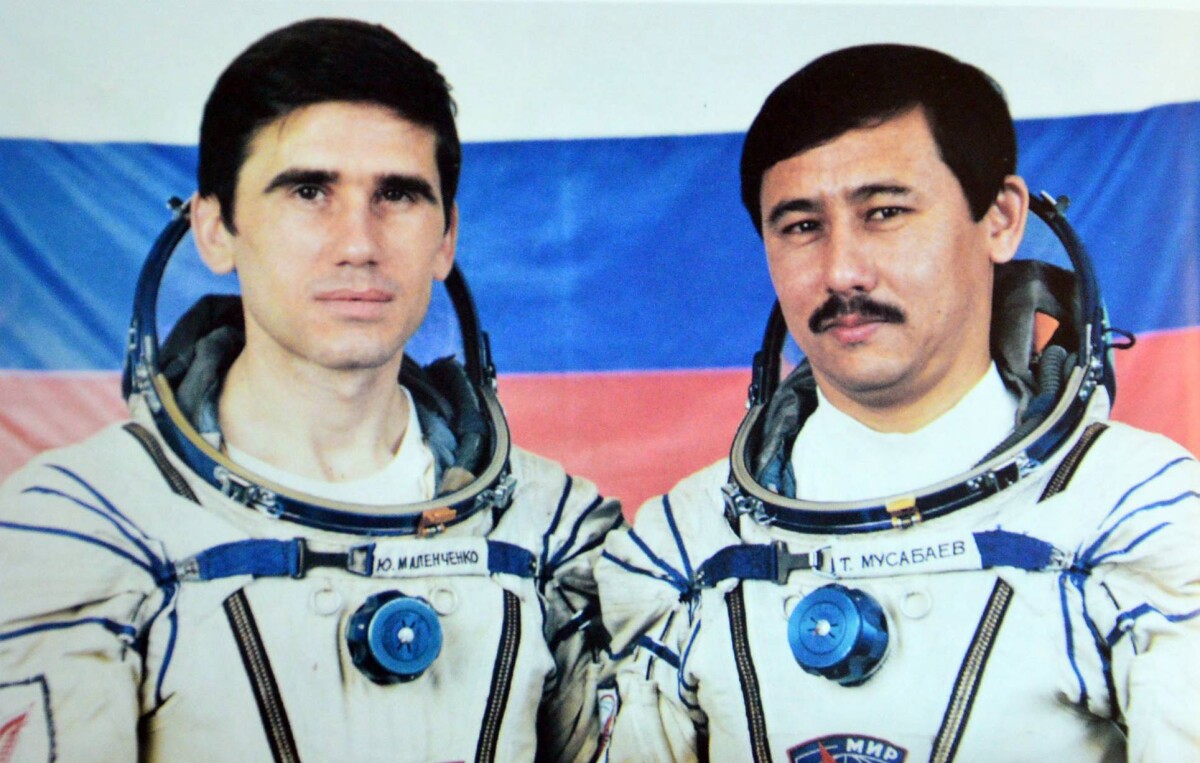
July, 1994. The commander of the crew was Yuri Malenchenko. During a 126-day space expedition, worked at “Mir” station with Russian cosmonauts Valery Polyakov, Aleksandr Viktorenko, Elena Kondakova, German astronaut Ulf Merbold.
The flight was terribly heavy; such refusals of the material part were never in the history of the station "Mir". And all such freelance situations, technology failures, some unfavorable flight conditions - everything falls on us, on me when I fly. I did not have a single flight without emergency situations, serious, I mean. Freelance situations present at many crews, but, such, from which you can get out under the book. And then the most serious situations occurred. It's just my fortune. This is the famous voltage loss at the station, the so-called U minimum, when we lost all the electricity at the station. This happened after the arrival of the next expedition to us, consisting of Alexander Viktorenko, Elena Kondakova, and Ulf Merbold and was due to the not very competent work of the MCC.
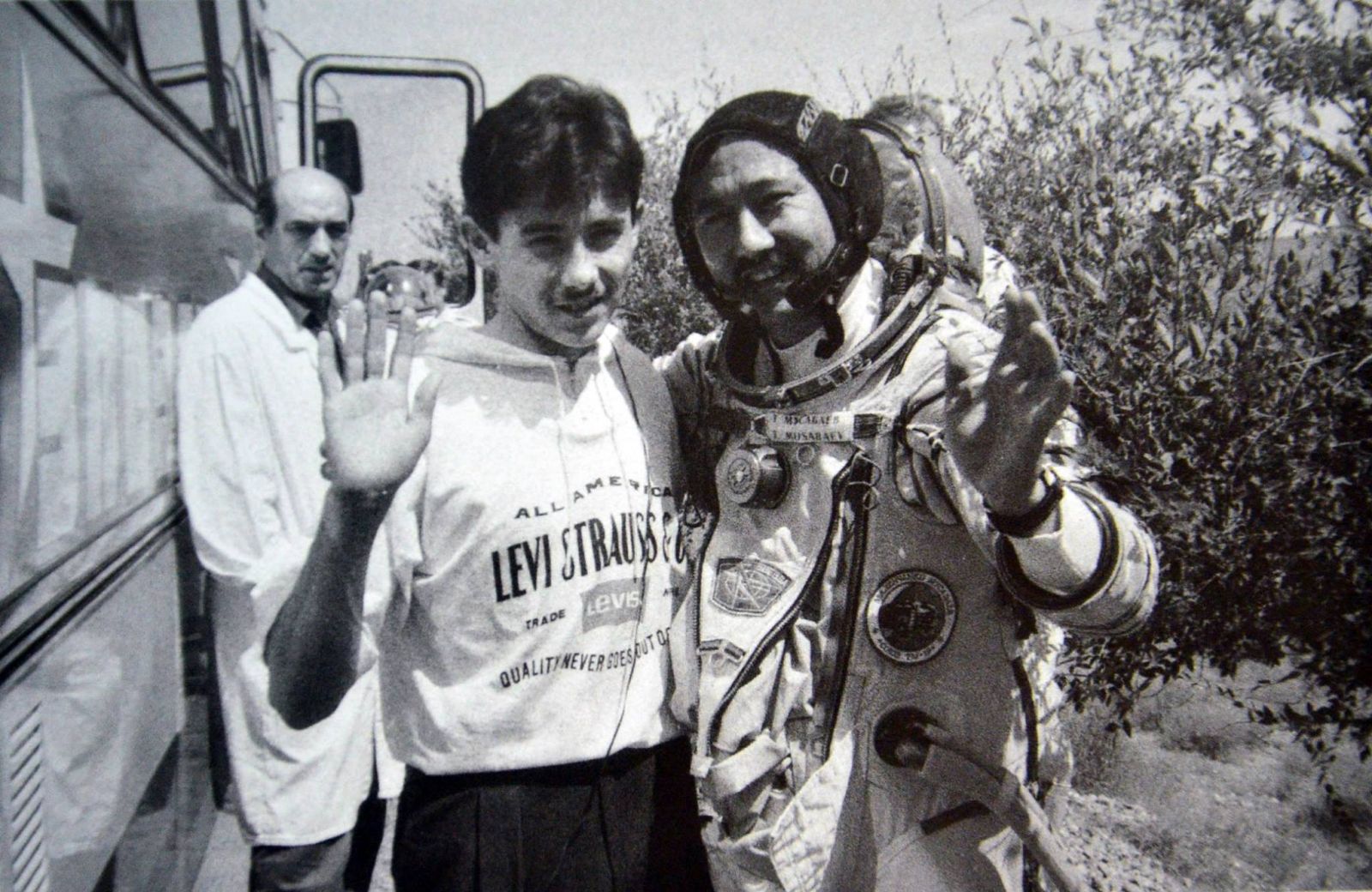
Talgat Musabayev with his son before the start
The ship is a means of salvation. Any ship that docked to a station should always be ready to undock and return to Earth, which means that it must have fully charged batteries; the power system should work clearly. When the ship with the crew moored, we, as usual, started charging the ship in the enhanced mode from the station. Then at us at the station the batteries were discharged, and thoroughly. At that time there was a very large percentage of the degradation of the solar panels of the “Mir” station, and it did not give the energy that is needed, that is, at the station, and so there was a shortage of electricity.
When we "went to sleep," the MCC issued a command to fully charge the ship, and the ship was charged at an accelerated pace from Mir's power sources, that is, from high-power 800-unit batteries. And the batteries ran out of charge. The accident occurred in the middle of the night - alarm in full force, everything is buzzing, yelling and we began fuss. But what to fuss about when the batteries are already low? And the terrible process of stopping the gyrodine began - these are large gyroscopes that rotate at high angular velocities, supporting the orientation of the station in space. We have almost a non-expendable system of orientation in space, unlike American ships, that is, we do not spend practically fuel, consumables. Gyrodine establish the orientation required to the station. So it started braking, there was no electricity, and since there is no promotion of gyrodine, there is a loss of orientation, once the loss of orientation has gone, the solar panels are not oriented to the Sun, and the solar battery system has reached out-of-the-way corners and ceased to work at all. There is no energy; drive motors are also electric there, that's such a vicious circle.
Everything ran out of charge, we went out to the solar part of the orbit, there was not any charge, and we fell into the hardest U minimum, everything went out. We turned everything off. At first, everything that was needed according to the instructions, then on board documentation in a freelance situation - all turned off. But it still was not enough, a deep discharge occurred. And we sat down, as they say, in a puddle. All systems began to die one by one, all ... And, in the end, died.
This was never in history - neither before nor after us. U-minima were, but insignificant. And here was the deepest. The discharge passed - and we were in total darkness, commands from the consoles can not be issued, since there is not enough voltage. Communication is lost. So that there is no connection - well, that's all! We did not have a connection with the MMC, and we started work on getting out of this state. This confusion, of course, is crazy.
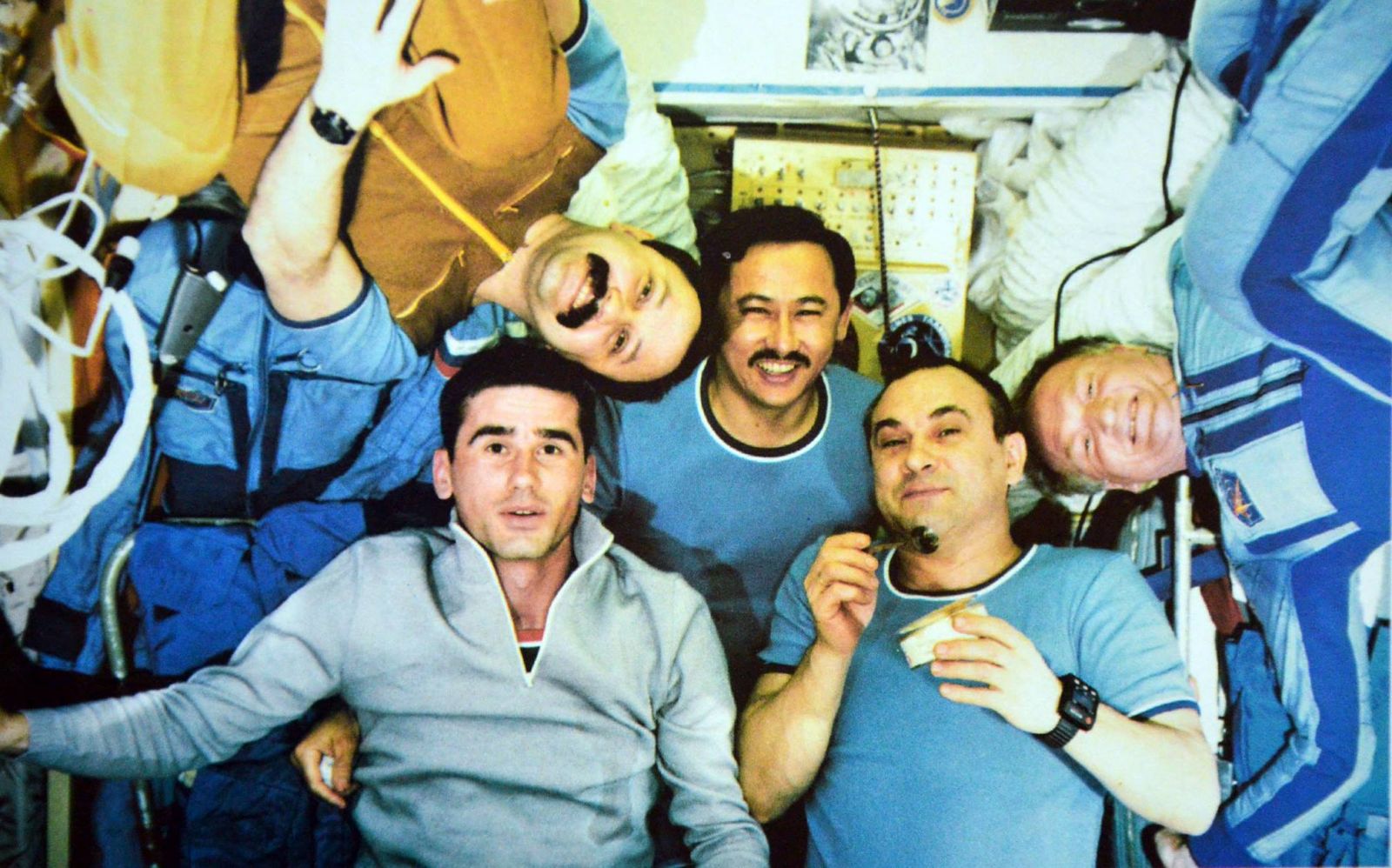
Yu. Malenchenko and T. Musabayev were cordially greeted in orbit
So, the two crews on board, Lena is in poor health condition, and she is a flight engineer, who flew in for a replacement. The adaptation of the new crew to weightlessness was difficult. So we worked mostly three of us: Viktorenko, Malenchenko and I. The others were on the pick-up – they are the doctor Valera Polyakov, he was already a long-lived of the station, Lena Kondakova and German astronaut Ulf Merbold. I remember, when there was the opportunity to flash a flashlight, his eyes were just square with horror. He flew for a month, it was the first such a long expedition of a foreign cosmonaut researcher. Thus, six of us had to work at the station for a month. According to life support systems, the station should be no more than five people. We were six - four Russians, one Kazakh, and even a German!
We did everything to fix the situation with energy supply. We twisted the engines of both ships station "Mir" on the Sun. We made the twist of the station, so that the solar orientation was as taught. But this is difficult, because the station is huge mass with the ships. It made several revolutions, and we observe by instruments that there is some kind of energy coming, and then the solar orientation is falling apart, as it must be supported by special devices, aggregates, such as gyrodine. But nothing works.
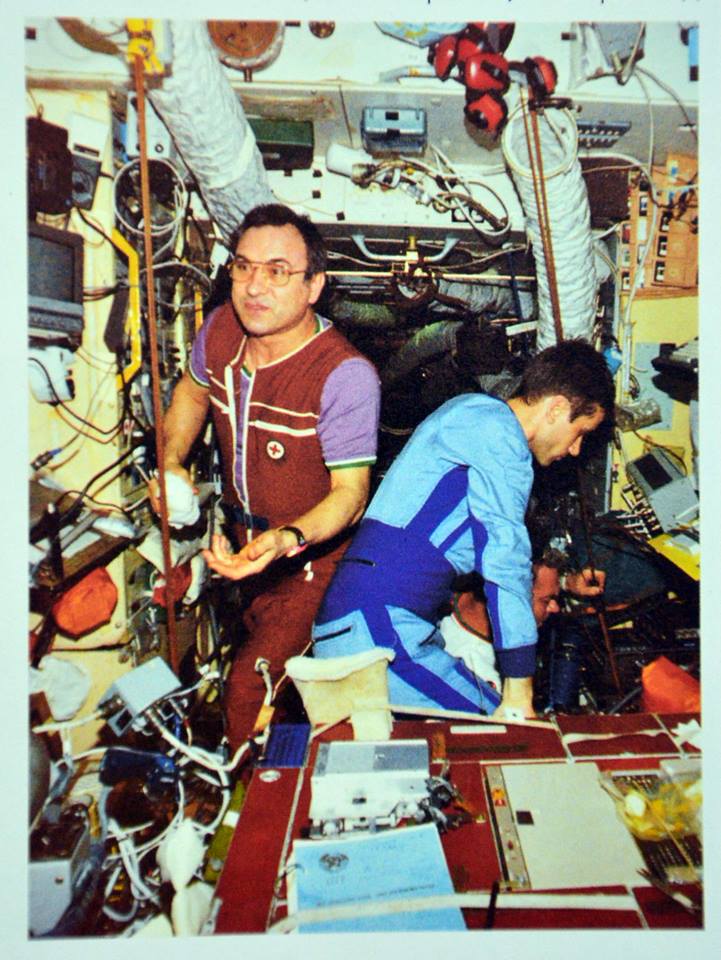
We were falling more and more into a terrible pit. As you know all life support systems at the station work only from electricity and, thus, all life support systems are turned off, okay, there are service systems, but no LIFE SUPPORT systems. We did not receive oxygen, there was nothing to do, the atmosphere was not cleaned of harmful impurities, carbon dioxide, etc. On Earth, all the dirt, dust on the ground after all - and we have the ventilation system turned off, all the fans and dust collectors do not work and all this was flying in the air, we were breathing it. And terrible silence! There is no such silence anywhere, in any corner of the Earth you will never find or create such a silence that was there. Sinister silence, no system works, there is nothing around you but cosmos ... It was creepy.
For almost five days we were coming out of this state, a huge work was done. Here I am, for example, as a flight engineer doing engineering work - on other modules of the station I found 800 (high-capacity batteries) blocks and got it in complete darkness. Ulf Merbold flew after me. I gave him some flashlights, which we took with us, as if felt that they could come in handy.
To get these batteries, you had to climb through the whole blockages: over the years that the station was flying, there was so much equipment! The batteries were behind the panels, which also had to be disassembled, and then, only in a certain sequence, pull them out, and God forbid to make a mistake with some connector, the automation may fail - in general there will be a scandal. And these 80 kg batteries I pushed ahead of me, first I transported it to the base unit, there again I got discharged. Panels, batteries - all this flew in the dark, horror! How we managed not to lose the screw-nuts and bolts in the dark?! I put it in my underpants, I apologize, because there was nowhere else to put. I had to show the wit.
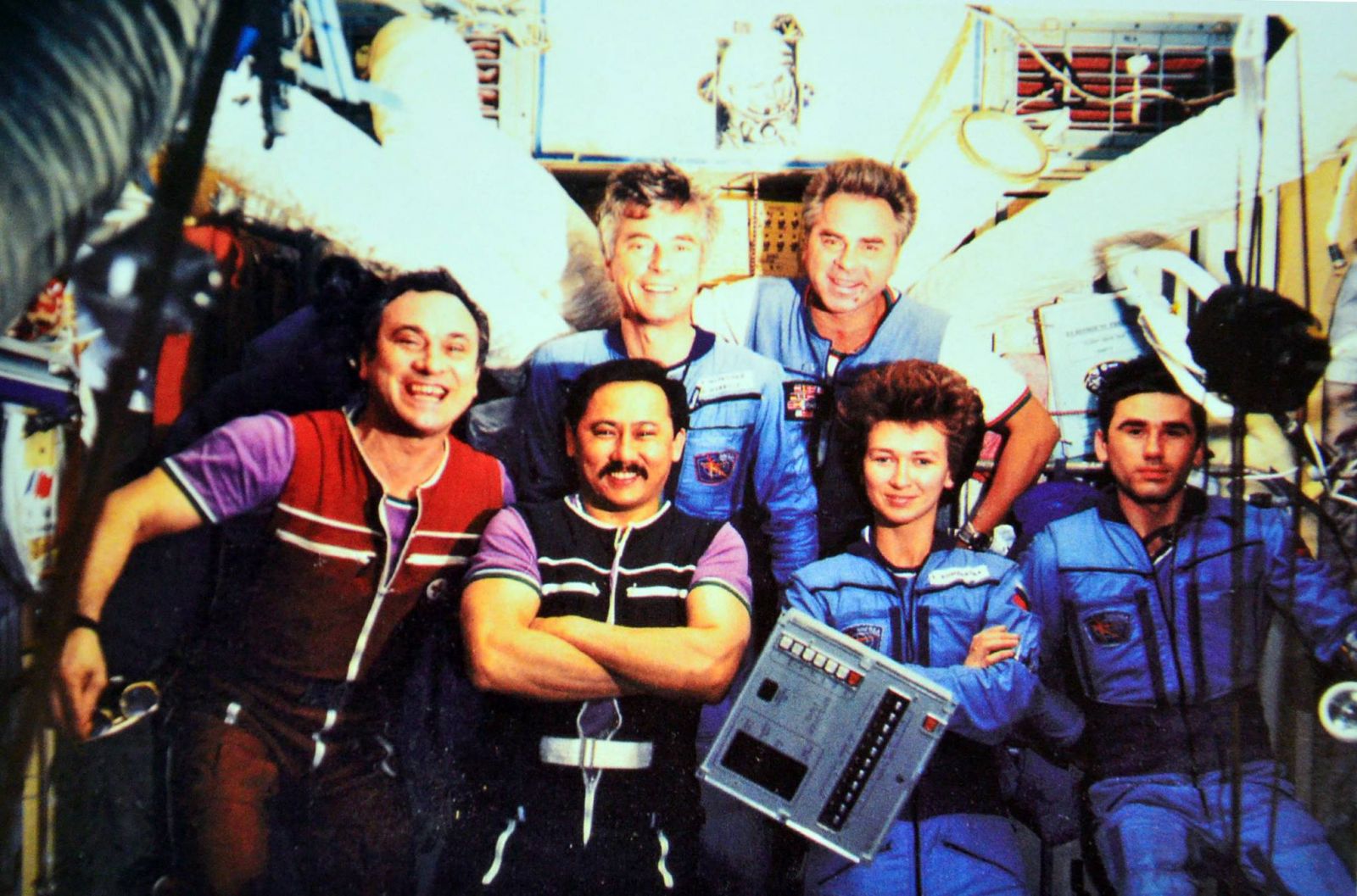
At the station: V. Polyakov, T. Musabayev, E. Kondakova, Yu. Malenchenko, A. Viktorenko, U. Merbold
There were spacesuits at the station for spacewalking, and they always had working batteries as light sources. This saved us. Malenchenko and I pulled out these batteries and adapted them - we bundled them with electrical tape to light bulbs and hung them in all corners of the station. You fly up to them, turn them on and only then the light was.
So, we had to be in a terrible situation, we were almost choking, sweating. All the maximum permissible standards for oxygen and carbon dioxide were exceeded. Oxygen sat in general to a minimum, generally moved beyond all thresholds, and carbon dioxide and other impurities rose to a high level. It was felt by breath. And there everything is breathing through ventilation, there is no convection, that is, a bag of your own atmosphere of harmful impurities, carbon dioxide that flies around you is created around you, and if you do not move, then you will simply suffocate from your own gases. In this situation, we were rescued by our beloved doctor Valera Polyakov - he took some shield and chased this air around us, which allowed us to work.
In addition, that there was nothing to breathe, there was no normal food, we ate cold canned food. To run the entire system, we all had to work in a crazy mode: constantly on duty at the consoles in turn, sometimes we did not sleep for 36 hours! Hungry, cold, in a dirty atmosphere, in pitch darkness, without a single sound and connection with the Earth - this was the worst thing. We were worried about the Earth - we understood that they were just going crazy, because nobody answered. Again, our savvy and luck helped us.
I then for the first time under the Kazakhstan program, it is possible to say, illegally take on board the amateur radio station, which had an individual, autonomous power source in the form of a battery. To our happiness, this amateur radio station worked. We tuned it to the frequency of the MCC and contacted our colleagues. In the worst case, we had to use the existing form number 14, which contains ballistic navigational data, prepare for landing. This information came to us at the station every day at the end of the day. But since there was no connection, we did not receive form number 14 for several days. Now we resumed its reception through an amateur radio station, which was forwarded to me by my classmate at the Riga Institute of Civil Aviation - Oleg Kiyan before the flight.
Of course, we could, in case of something, fly at our own peril and risk, turn on the engines and without the necessary coordinates, be at least somewhere, for example, in the ocean, and this is doom.
It was unpleasant, definitely. But psychologically we are prepared very good, so there was no panic, but it was terrible what there to say. We were helped by the serious professionalism of our training and high awareness and high spirit. We had a powerful space company, you can say, a friendly space family - Victorenko, Polyakov, Malenchenko, I, Kondakova, Merbold. Guys all are strong in spirit, with a sense of humor, and the woman on the ship is, and a real German! We even managed to joke sometimes, but how else. Discharged this terrible situation with some jokes, then it was somehow easier to survive.
It even seems to me that it was from that time that I especially fell in love with anecdotes, as a means of salvation in an emotional crisis. Here's one of them. This anecdote was born back in Soviet times, when they began to send representatives of the socialist countries into space one by one.
Another cosmonaut-researcher returned to his homeland. They ask him:
- And how? Did you like cosmos? Did you fly well?
- “Yes, yes! Well! Only my hands hurt”, answers the astronaut.
- Why?
- Because I just ... and the commander … my hands - do not touch, do not touch!
It's actually so it was, it's not just an anecdote appeared! After all, the commander and the flight engineer are the main on the ship, and the cosmonaut-researcher is the passenger, now they are already called space tourists.
We came out of the energy hole. The MMC was extremely pleased that we, by our efforts, started all again. The process of starting all systems is a very complicated process. We unrolled the gyrodine alternately - because there was not enough energy at all. We launched a computer - an on-board digital computer Salyut-5, and it, too, was a very capricious, the old one, still reliable but old. Thousands of connectors, terminals, all they needed to find, wipe. In such situations, behind the panels you fly, everything in your eyes, oh!
With such heroic efforts we, we can say, won and saved the station. This was the second birth of "Mir".
Translated by Raushan MAKHMETZHANOVA
